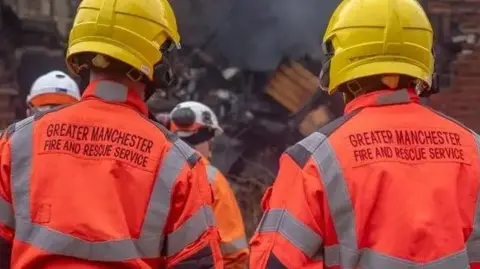Firefighters could become medical first responders
 GMFRS
GMFRSGreater Manchester's firefighters could be asked to be the first responders in some medical emergencies in a bid to "save more lives", the region's mayor said.
Andy Burnham has asked chief fire officer Dave Russel to look at how fire crews could be used to help take pressure off the ambulance service.
He said firefighters can respond more quickly to emergencies than paramedics who can be "trapped" waiting to offload patients at A&E.
Dave Pike, secretary of the region's Fire Bridges Union, said the proposal was "exciting" but discussions needed to be held over pay and training.
A similar scheme was trialled in 2015-16 and found to have the potential to save 63 lives a year and help 77 people avoid life-changing neurological damage.
Mr Pike said the fire service had gained "good experience" in the pilot, where they were called to between three and five cardiac arrest incidents a day.
But the union representative said the expansion of their role would lead to an increase in workload, and negotiations over pay and training would have to take place.
Mr Russel, who heads Greater Manchester Fire and Rescue Service (GMFRS), has been asked to look at the proposal and report back by the end of the year.
He said he welcomed the "opportunity to explore" staff can support the ambulance service with emergency medical responses.
Faster response
Mr Burnham said firefighters' training and pay would need to be looked at if they took on this "extra responsibility".
But he said the union had indicated it would support the plan.
He told BBC Radio Manchester he did not know the cost of the proposal yet, but promised to consult with residents as it could lead to changes in council tax.
There are 41 fire stations across Greater Manchester spread across the region's 10 districts.
The average response time of crews was seven minutes 30 seconds, Mr Burnham said, meaning they were "faster" than ambulances.
"That's no criticism, but through getting defibrillators more quickly to people who need them in Greater Manchester, we will save lives.
"It's the right thing to do," he said.
The move would help free up the North West Ambulance Service in times of "increased pressure and demand", the mayor added.
Mr Russel said the proposal would be developed in collaboration with "staff, trade unions, and our partners" to build on the pilot and provide the "best possible service".
The North West Ambulance Service has been contacted for comment.
Listen to the best of BBC Radio Manchester on Sounds and follow BBC Manchester on Facebook, X, and Instagram. You can also send story ideas to northwest.newsonline@bbc.co.uk and via Whatsapp to 0808 100 2230.